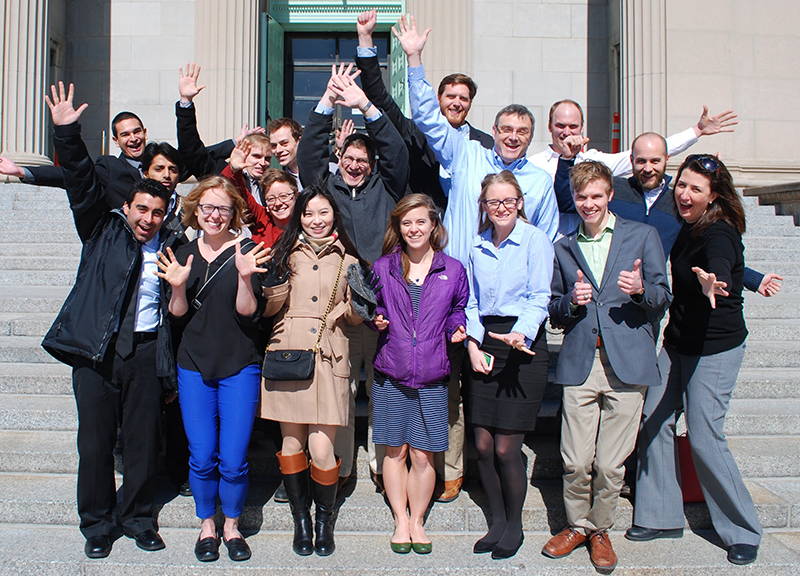For more than four decades, the Nelson Institute’s Energy Analysis and Policy (EAP) program has been a leader in energy education, offering students in almost any graduate program on campus the opportunity to link big-picture energy issues with their graduate training. Supported by the Nelson Institute for Environmental Studies and the Wisconsin Energy Institute (WEI), EAP is the only energy-related graduate certificate and PhD minor at the University of Wisconsin–Madison. Energy issues affect our environment, policy, economy, and daily lives, and EAP captures this breadth.
“This is one of the oldest programs in the country and our alumni have emerged as leaders in government, non-profits, industry, and have pursued a wide range of careers,” said EAP Engagement Lead Tracey Holloway, Gaylord Nelson Distinguished professor with the Nelson Institute for Environmental Studies and the Department of Atmospheric and Oceanic Sciences. “When people think about graduate-level energy training, we want Wisconsin to be the first name that comes to mind.”
The growing community of EAP students – now a record 50 enrolled – spans more than 15 graduate programs, from policy to engineering. The program offers scholarships, professional skill-building, and networking, in addition to interdisciplinary classes taught by its world-class faculty.

“As with the genesis of many programs and departments in the university’s long history, the EAP program arose from faculty research,” said retired UW-Madison professor and Nelson Institute affiliate, Wes Foell who helped to lay the groundwork for the development of the EAP program.
“The program included faculty and students from engineering, business, economics, geoscience, environmental studies, urban and regional planning, and political science.”
Foell shared that when the EAP certificate was officially launched in 1980, the original plan was to have a 40-credit program. Over time, the program evolved into its current form: a 13-credit certificate that can be paired with nearly any graduate program on campus.
Today, EAP offers an interdisciplinary curriculum that prepares students for energy-related careers in industry, government, consulting and non-profits by providing real-life experience in designing, conducting, and communicating analysis. Through EAP, students gain an understanding of “languages” beyond their primary major, such as engineering majors learning a bit of policy lingo and vice versa.
To bring more awareness to EAP, Holloway and EAP Program Chair Rob Anex, professor of Biological Systems Engineering, have plans to increase partnerships as well as increase student engagement.
“Moving into the next 40 years, our goal is to grow the program to tackle the enormous global energy transition underway,” said Holloway. “One of the things that makes EAP unique is that it can be added to nearly any graduate program on campus. We really want to build a generation of energy leaders out of Wisconsin that reflect the diversity of skills and expertise needed to support the future of energy at the state, national, and global scale.”
To support these efforts, EAP has been growing a network of advisors, supporters, and leaders in energy-related fields. Jeff Rudd, a Nelson Institute PhD alumnus and Board of Visitors member, has worked closely with the EAP faculty over the past few years of program growth.
“The faculty are exceptional when it comes to teaching,” said Rudd. “They are experts in their field and are world renowned. They also understand the ramifications of regulations and they convey this to their students. To be able to teach across those boundaries is remarkable.”
Rudd shared that he and his wife, Jeanne Bissell, established an endowed EAP Professorship in large part because of the excellent work he has seen from the faculty.
One way in which the faculty teach this intersection of policy and science is through the EAP Capstone course, where students work in teams to tackle energy analysis needs of clients in industry, government, and non-profit organizations. Holloway says that “many students have cited this immersive experience as one of the most valuable aspects of the EAP program, and it’s just one of the ways we’re putting a lot of emphasis on the student experience. We’ve changed the prerequisites, we’ve changed the credits, we’ve introduced a new professional seminar, and added a new annual trip funded by donor support. We’re really working to make EAP a signature program of the University that stands out on a national and international scale.”
Foell, who helped found EAP, continues to advise and support the program: “Having interacted with EAP students for several years, I am extremely impressed by their diversity, skills, and enthusiasm. The same goes for the EAP faculty with their diverse and unique research capabilities. In collaboration with the broader Madison campus, they have an opportunity to play an increasingly important and visible role in addressing the world’s energy and climate challenges. Our university’s faculty and academic resources are second to none in their potential to do this.”
Here’s to even greater success in the next 40 years – happy birthday, EAP!